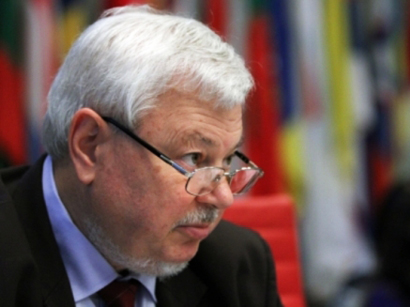Baku, Azerbaijan, Oct.22
By Sabina Ahmadova - Trend:
The ceasefire violations continue along the line of contact of Armenian and Azerbaijani troops and the border, which increase the risk of escalation and keep the level of tension high, OSCE Chairperson-in-Office Personal Representative, Andrzej Kasprzyk told Trend on Oct.22.
He said the number of ceasefire violations has dropped compared to late July and early August.
Kasprzyk added that in their most recent statement, the Minsk Group co-chairs urged the sides to take steps to reduce tensions and avoid violence, particularly against the civilian population.
"My team and I continue our work of monitoring the situation in line with our mandate and work with the Minsk Group co-chairs to further reduce tensions and ultimately, to help the sides to resolve the conflict peacefully," he said.
The co-chairs of the OSCE Minsk Group from the Russian Federation and France (Ambassador Igor Popov and Ambassador Pierre Andrieu) traveled to the region last week to meet with government leaders of Azerbaijan and Armenia and participate in an OSCE Monitoring Mission on the Armenian-Azerbaijani border.
During the visit to Azerbaijan and Armenia, OSCE Minsk Group co-chairs urged the sides to take steps to reduce tensions and avoid violence, particularly against the civilian population in the zone of Nagorno-Karabakh conflict.
In both capitals, the co-chairs discussed preparations for the upcoming summit hosted by French President Francois Hollande later in October in Paris.
The co-chairs recounted the recent meetings of the presidents in Sochi and Wales, and noted the stabilization of the situation along the line of contact and border after the increase in violence this summer. They also expressed hope that recent ceasefire violations would not escalate.
The conflict between the two South Caucasus countries began in 1988 when Armenia made territorial claims against Azerbaijan. As a result of the ensuing war, in 1992 Armenian armed forces occupied 20 percent of Azerbaijan, including the Nagorno-Karabakh region and seven surrounding districts.
The two countries signed a ceasefire agreement in 1994. The co-chairs of the OSCE Minsk Group, Russia, France and the U.S. are currently holding peace negotiations.
Armenia has not yet implemented the U.N. Security Council's four resolutions on the liberation of the Nagorno-Karabakh and the surrounding regions.
Edited by SI






